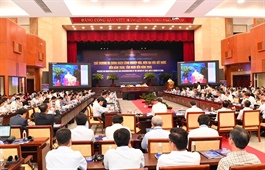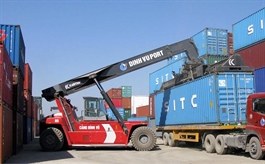Importers, exporters impacted by exchange rate volatility
Importers, exporters impacted by exchange rate volatility
The recent fluctuations in the US dollar and Japanese yen have both positive and negative impacts on Vietnamese traders, according to experts of the Ministry of Industry and Trade (MoIT).

The Vietnamese dong has strengthened by 12 per cent against the Japanese yen this year while it has weakened 2.6 per cent against the US dollar.
Officials said the US Federal Reserve (Fed) has tightened monetary policy to curb inflation in the US. Prices in the US have been rising at their fastest rate in almost 40 years while the Bank of Japan (BOJ) has continued with monetary easing to support the economy's recovery from the pandemic.
According to experts, the depreciation of the Japanese yen has partially benefited some businesses with loans to pay in Japanese yen and Vietnamese importers.
Many Japanese food and household items are favoured by Vietnamese consumers. The weaker yen has caused the prices of many items being sold at supermarkets in Viet Nam to fall by 15-20 per cent.
Viet Nam’s BRG Retail Co., Ltd. imports more than 1,000 items directly from Japan. After the Japanese yen weakened against Vietnamese dong, the price of Japanese goods also went down.
"We usually sign an annual contract with a supplier in Japan, but we pick up the goods every month," said Nguyen Thuy Duong, Deputy General Director of BRG Retail Company.
Trinh Ba Ngoc, director of Osaka Semitsu, said not all Vietnamese businesses would immediately benefit from the depreciated Japanese currency. Annually, his company had to buy equipment from Japan at a cost of VND100 billion, however, his company had to purchase via an intermediary partner so it has not benefited from a depreciated yen.
In contrast, Vietnamese exporters working with Japanese partners suffer a loss when they convert Japanese yen into Vietnamese dong.
They explained that in the long run, a weak domestic currency will make imported goods more expensive. As a result, Japanese consumers will limit their spending on non-essential imports. This will lead to lower demand for imported goods from all countries, including Viet Nam.
When the US dollar appreciates against other currencies, including Vietnamese dong, it increases the price competitiveness of exported goods from Viet Nam. However, it raises costs for Vietnamese importers.
In the context of a sharp increase in the price of raw materials, a stable exchange rate will help play an important role in reducing pressure on imports, while minimising difficulties for businesses and supporting Viet Nam’s economic recovery.
Due to the rapid and unpredictable fluctuations of the global market, the MoIT has continued to direct businesses to take advantage of Free Trade Agreements (FTAs) and make use of reduced tariffs.
In addition, the Ministry has also helped connect Vietnamese manufacturers with foreign suppliers via trade promotion, market development, and the application of the Internet or logistics services, while creating more favourable conditions for import and export activities.
The Bank of Japan’s (BOJ) policy of keeping Japanese rates pinned down to support the economy, combined with rising US interest rates, has been a major factor in the Japanese currency’s recent weakness.
To combat untamed inflation, the Federal Reserve raised its key interest rate by another 0.75 per cent on Wednesday night — further increasing how much consumers will pay on debt like credit cards, mortgages and other loans.
The federal funds rate, which indirectly determines the cost of loans, has increased from near-zero to a range of 2.25 per cent to 2.5 per cent. This is the fourth-rate hike in five months.

























